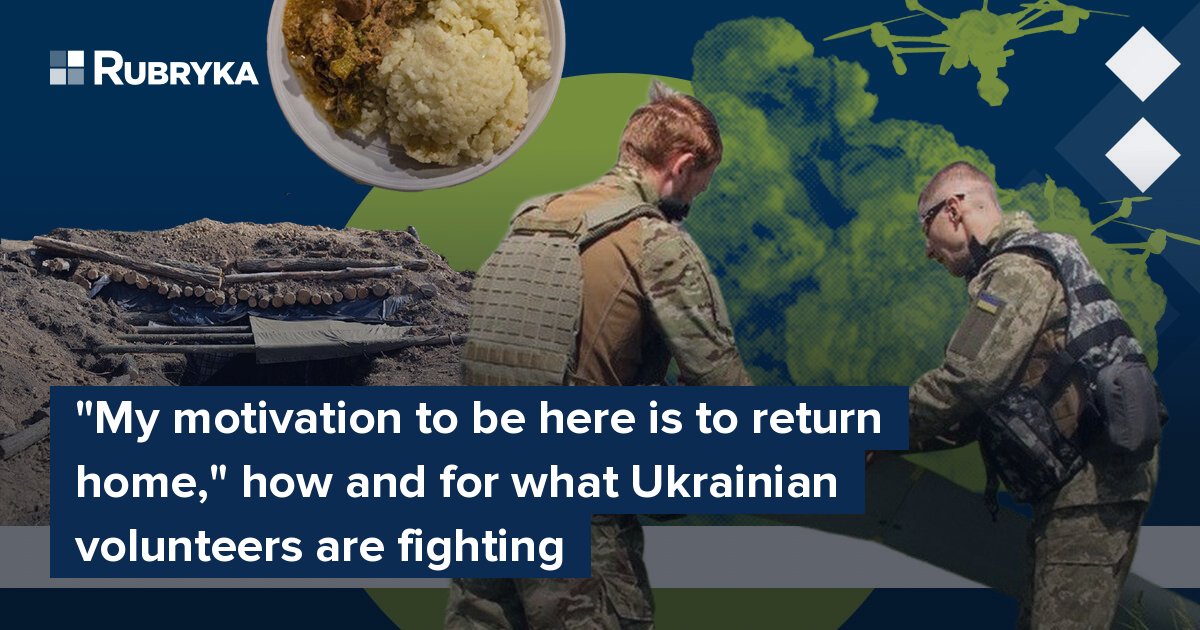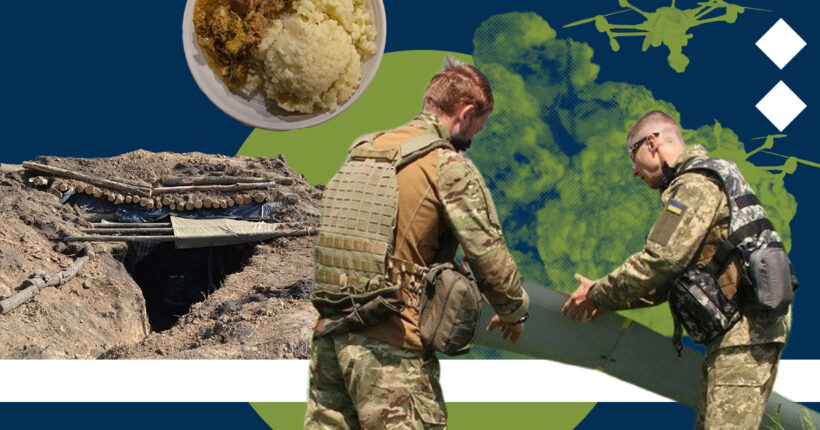
Rubryka's correspondent visited the point of permanent deployment of one of the volunteer formations and spoke with three defenders about their motivation, everyday life on the front lines, and the feeling of home simply in the trenches.
Udachnyky
Cities and villages that cannot be named for security reasons. The checkpoints here are bathed in the summer sun. We pass one by one, catching the smiles of the soldiers and their "Have a nice trip!". Meanwhile, the driver notes: "It's safe here; the shelling doesn't happen here often."
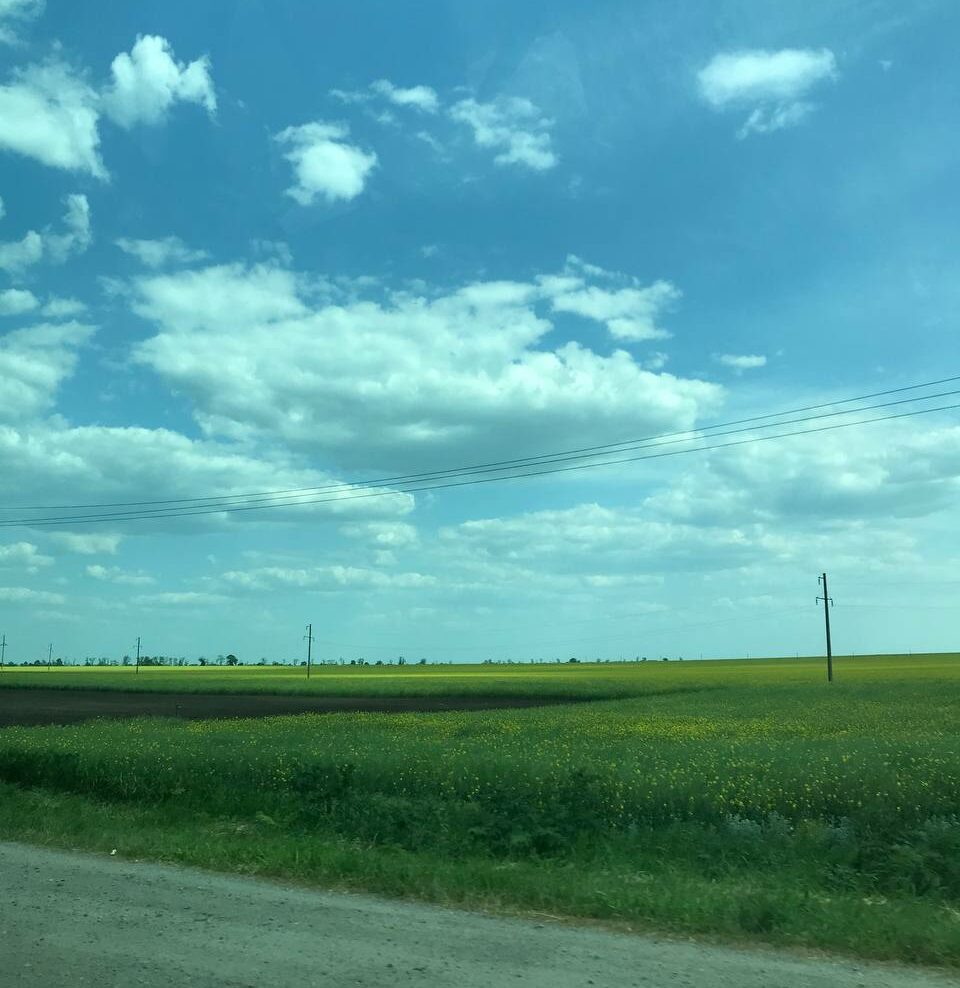
The road that leads to the Udachnyky point of permanent deployment of military units
We reach a settlement 37 kilometers from the Russian positions and active fighting. Driving here, you expect to find empty streets and the sad, lifeless atmosphere of a front-line town, with numerous shell holes and empty streets. Instead, the shops are open, and there is even a coffee shop with lots of goodies — people are everywhere. Although the main part of its visitors, of course, wears camouflage.
In a few minutes, the commander of the volunteer unit meets me. This is Doc, a tall, stout man with whom we drove straight to the Udachnyky point of permanent deployment of military units.
Volunteers of the Unmanned Aviation Service of the Ukrainian Volunteer Army (UVA) call themselves Udachnyky, or the lucky ones. In general, the Ukrainian Volunteer Army officially appeared in December 2015 and still exists, although, as Wikipedia says, the UVA took its first battle in 2014. Some joined the Armed Forces of Ukraine, but the Unmanned Aviation Service continues to operate entirely voluntarily.
Who are these volunteers?
"At that moment, we heard volleys of Grads again. We didn't know where to run and felt like ants…"
While it is evening outside, we settle in the building. Two young-looking guys enter the room. They leave the machines in a nearby room and come to meet.
"Aktor," says one of them.
"Koba," another continues the introduction.
After a few minutes of conversation, I find out that the boys have just returned from the hospital.
"We had IVs after a concussion," explains one of them.
"We lay down tired, resting after tasks. I cooked food, watched the TV series, and started to doze off when there was a blast. A missile. Three of us were concussed," says Actor, puffing on a cigarette. While he exhales ashy smoke, Koba continues: "I heard something coming and shouted: 'On the floor, damn it.' There was an explosion. We did not immediately understand what it was. We went out and understood we were being covered with Grads."
They quickly went to the second house to see how they were doing. At that moment, they heard volleys of hail again. "We didn't know where to run and felt like ants. They hit the sector where we were. There was nowhere to hide. We managed to evacuate, but I got a concussion."
Then was hospitalization and some time in the hospital.
"Here we live life one day at a time"

At the permanent deployment point, the military improves their knowledge of first aid
Aktor is an operator of the unmanned aerial vehicles of the UDA Unmanned Aviation Service. He comes from Dnipro and, before the full-scale war, worked as a shop foreman at a factory. Aktor has wanted to go to war since 2018, but it didn't work out then. He joined the volunteer battalion after February 24, 2022, when Russia launched its full-scale invasion. To the question: "Why?" he responds: "I went to help people."
Taking a drag on a cigarette, he continues: "I don't want people to come to our country who will command someone and something. I don't want them to destroy everything our people have earned for years. The occupiers are destroying it all, and I wouldn't want that. I want to stop it."
Koba has been actively volunteering since the beginning of the full-scale invasion. And even earlier, he was a miner in the Luhansk region. When his city was occupied, he decided to join the UDA as an aerial scout.
When I ask why they didn't join the Armed Forces of Ukraine, the guys say that they don't like systems and orders. And here, in the volunteer battalion, one feels more freedom and personal motivation of everyone who joined.

Aktor and Koba are resting in sleeping bags on the floor
"We, volunteers, are people who just wanted to help our country," says Aktor.
Looking ahead, he continues: "Well, do you see why I am constantly walking and laughing? Because I try to perceive reality that way. Why be sad if tomorrow we can die? We are happy here for every little thing."
After some time, Koba says: "Here we live life one day at a time because you don't know what will happen tomorrow."
Brothers in blood are brothers in arms
Aktor and Koba are cousins. Having left their jobs in their cities, perhaps at the same time they joined the UDA — they realized that they would not sit still.
"Dnipro. We sit and talk, and Aktor says: 'Do you want to join my unit?' I answer: 'Why not!' That's how I joined UDA," says Koba.
When we talk about what it's like to be in the volunteer battalion after civilian life and what needs to be done, Aktor says: "It depends on the task, which may be different. Sometimes we leave at four or six in the morning and fly there until the latest — six or seven in the evening. We do reconnaissance to see what the Russians are doing. Sometimes we adjust the artillery that works according to the goals we give." Koba nods his head in agreement.
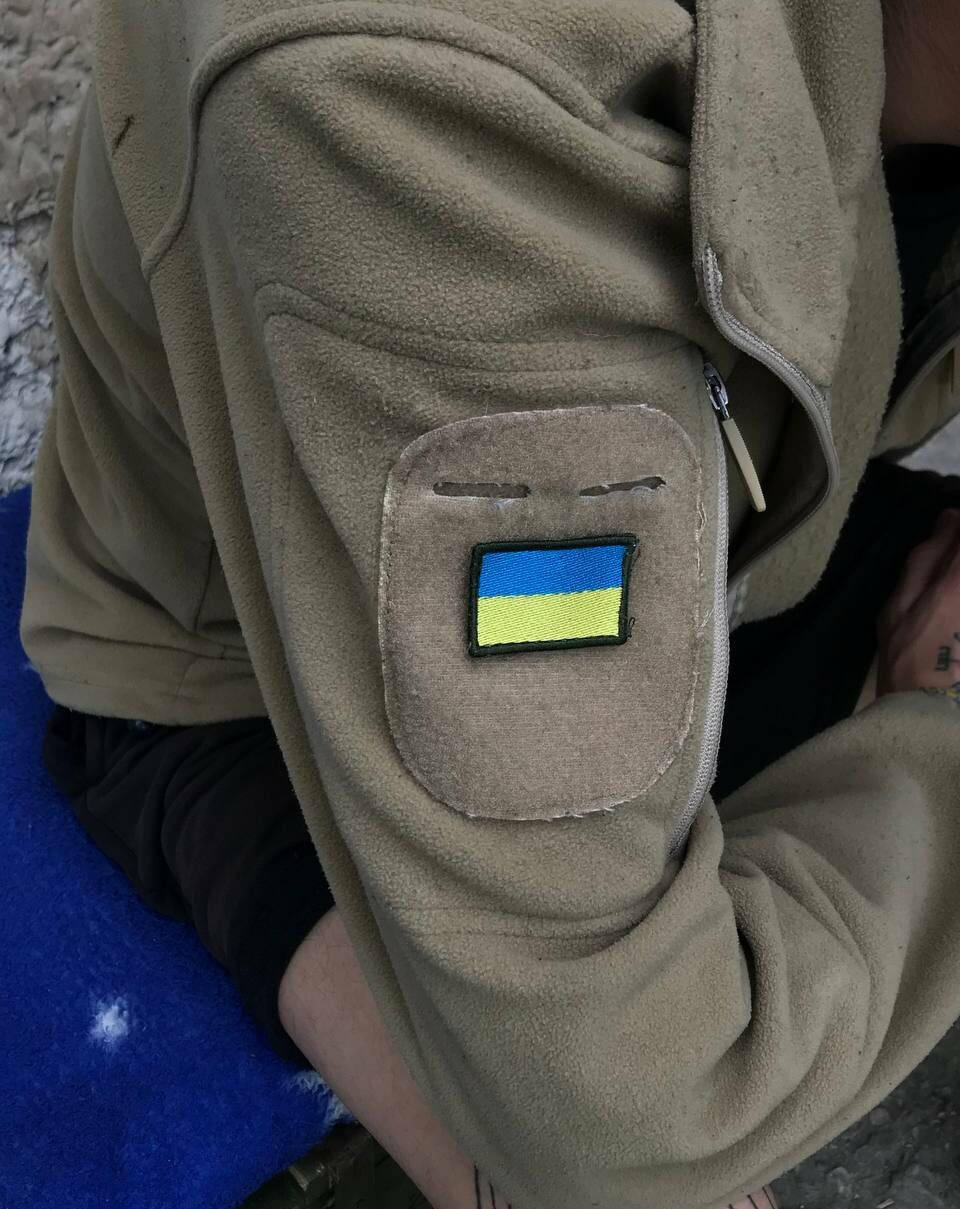
"It does not feel that we are from different regions of Ukraine," says one of the volunteer fighters
Aktor shares that they spend almost all their time on the front line and only keep in touch with close friends. Among their goals is the fulfillment of tasks. When they come to the front-line cities, they rest more in the rear. "I just want to go outside and walk around, see people because I haven't had enough of that," he adds after some time.
When I ask the boys why they are here, after a moment of silence, Koba says: "It's like a family here. There are no orders or anything like that. It does not feel that we are from different regions of Ukraine. Everyone understands and supports each other."
It doesn't matter from where. It's important why
The next day at the PPD, Koba's opinion about the diversity of regions was practically confirmed, but on a more global level — within the borders of countries. Andrii, a volunteer from Belarus, came to Udachnyky.
"I am not a member of the Ukrainian Armed Forces and do not receive a salary. Therefore, I can come to the front and leave. It all happens voluntarily. I go on vacation occasionally, so I don't feel like a full-fledged military man. I feel more like a volunteer here," the Belarusian says calmly.
When asked why he joined the voluntary formation, he said he was interested in Russia losing. Only then there is a chance for Belarus. "I believe Ukraine has culturally moved very far from Belarus and Russia. Here you feel what a freedom-loving person is like, who understands what freedom of speech, freedom of assembly, and democracy is. If the police beat a person, it is not normal in Ukraine."
 Andrii is a volunteer fighter from Belarus, defending Ukraine's independence
Andrii is a volunteer fighter from Belarus, defending Ukraine's independence
Andrii explains that it was personally important for him to resist Russia somehow. At the front, his goal is not the war itself but what it can change.
"We are not in this war to fight during all our lives, but for Russia to simply f*ck off. I hope that when it finally happens, there will be less need to take up arms," the volunteer fighter explains. "If you don't do politics, then politics do you. Therefore, on February 24, when Russia launched its invasion of Ukraine, I went to join the territorial defense. I was ready for anything. It was important for me to resist Russia at least somehow so that life does not seem like all beer and skittles."
The volunteer says that from time to time, all the military here helps the locals because most of those who stayed simply have nowhere to go.
There is a humanitarian catastrophe. The villages are still holding up more or less normally because people have gardens and livestock, so they live on their own products. Almost all the people left from the villages further away, closer to the front line. Very few locals stayed — only those who had nowhere to go.
"We periodically communicate with them and help with food and medicine, but people try not to walk on the streets. The situation is worsened because in such villages, almost all the houses are destroyed, and people have nowhere to live, but they continue to live there," says Andrii.
Officially, Belarus does not take part in the war. However, only in the first incomplete three months of the full-scale war 633 rockets were fired from the territory of Belarus at Ukraine. In the second year of the war, this continues. At the same time, according to various sources, from 500 to 1500, Belarusians are fighting for Ukraine. As long as Lukashenko is the president, all of them will be in court after returning home. For this reason, we cannot reveal Andrii's name and tell his story — it could be dangerous for a soldier.
"You get used to fear, and don't react like that anymore"
Although the authorities organize evacuation flights, some people leave only after the Russians destroy their houses. Koba described his strangest observation of locals near the front: "Imagine a settlement and active shelling of the sector. My comrades and I are wearing helmets and bulletproof vests, and here at some point, a local man in slippers and a tracksuit runs up to us, holding out his phone, saying: 'Look, look, I captured the shelling on camera.' We silently look at each other in shock. Honestly, I'm afraid there are such people because they don't care for themselves, being sure that we will save them."
Aktor intervenes in the conversation: "Of course, we ask the locals to hide in basements and protect themselves. But here, you get used to fear and don't react like that anymore. You get used to this adrenaline."
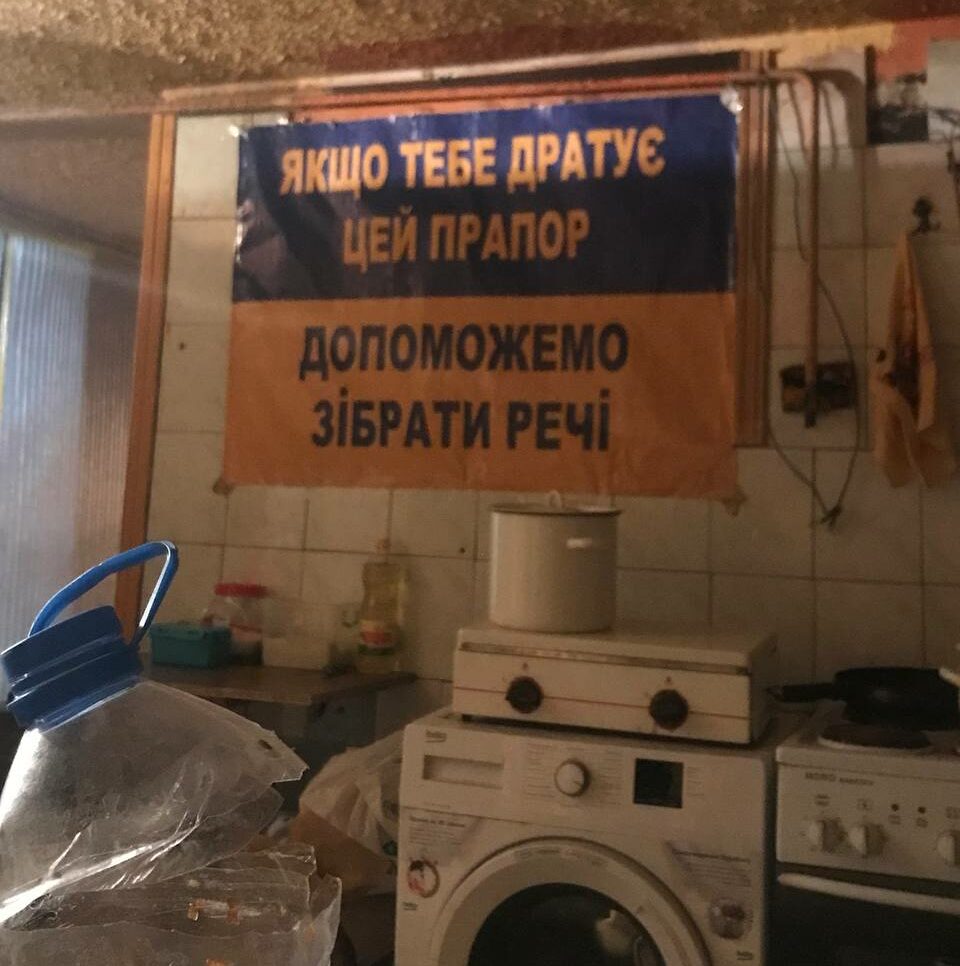
Life of military personnel on PPD
After that, silence falls for some time. Then I ask the boys what such a front-line city reminds them of. In a moment, I hear Koba's calm, measured voice: "Home."
After a while, the volunteer continues: "In the Luhansk region, the sound is just like here. It is as if I have come home. Everything is broken and destroyed. I'm already used to this kind of familiarity, not like in those noisy cities."
"Koba, it seems to me that at this rate, you will begin to memorize every pebble here," says Aktor, smiling.
And in a few seconds, Koba says: "My motivation for being here is to return home. I need to go home."
Newsletter
Digest of the most interesting news: just about the main thing



